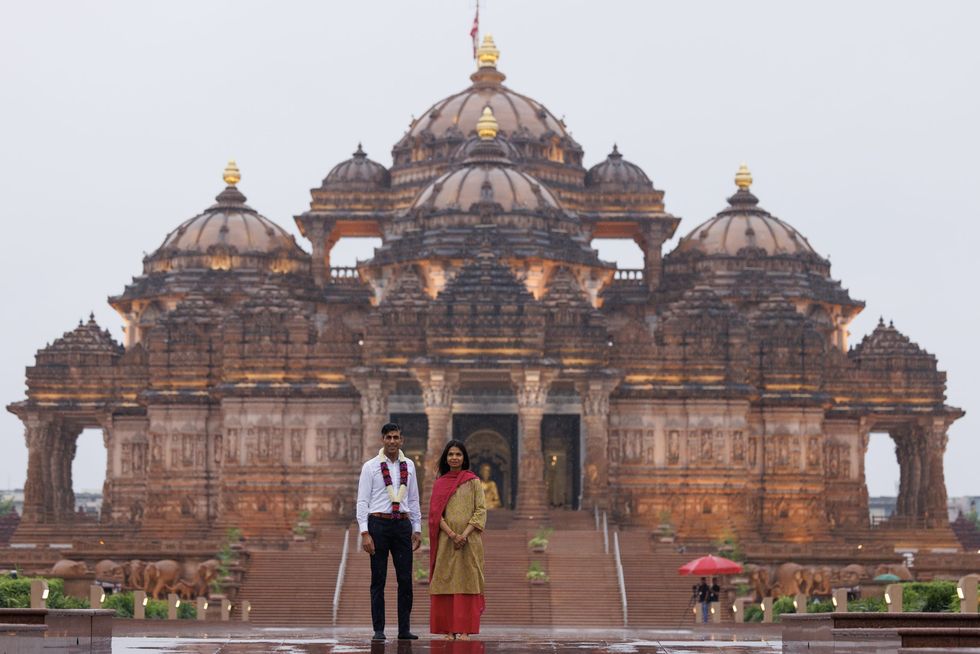HEADING to New Delhi for the G20 summit might have felt like a great escape for Rishi Sunak, leaving behind crumbling concrete in classrooms and damning opinion polls for his first visit to India as Prime Minister.
The Sunaks were greeted enthusiastically by the Indian media. A British Prime Minister of Indian origin, paying his first official visit, added human interest to the summit.
Prayers at the spectacular Akshardham Temple displayed the Prime Minister’s Hindu faith more visibly than it has been in Britain. Sunak’s faith is important in his personal life, but peripheral to his politics and policy agenda. He tends to see the lack of attention to his being the first of Britain’s 57 Prime Ministers to practice a minority faith as a positive affirmation of British tolerance.
Sunak declared himself proud to be considered a “son in law” of India and an embodiment of Britain and India’s living links. He has few illusions that his Indian ethnic origin will have any bearing on the hard-headed calculations of the Modi administration.
Indeed, Modi kept world leaders guessing over who was coming to dinner at his house, before dashing Sunak’s hopes by choosing US President Joe Biden instead. Securing the admission of the African Union to the G20 underpinned India’s claim to have emerged as the leader of the global south, perhaps a new non-aligned movement for this century.

Sunak got a businesslike twenty-minute bilateral meeting with Modi at the G20 margins, though he may return again next month for the cricket world Cup, especially if trade talks progress well.
Ironically, if Rishi Sunak had never become Prime Minister, we could well have a UK-India trade deal already, albeit not for particularly good reasons. Liz Truss’s focus on the post-Brexit optics of making deals made her willing to sign up to whatever was quickly negotiable, rather than how to negotiate a deal that the UK would want to sign.
Too much British discussion of a UK-India trade deal obsesses over whether immigration might be a sticking point. This is an outdated hangover effect from sharp UK-India clashes over immigration, especially during Theresa May’s time as Home Secretary before 2016 and as Prime Minister afterwards.
But Boris Johnson’s post-Brexit immigration system introduced everything that the Indian government was pushing for and more – not in a UK-India bilateral deal, but as the UK’s more liberal visa policy for everywhere outside Europe. Maybe the UK missed a post-Brexit trade trick with that unilateral liberalisation of non-EU immigration, and could have held back some of those changes as part of its negotiating hand in future trade deals.

Any trade deal content on immigration now would be technocratic, such as tweaks to the inter-company transfer processes. Indian migration to the UK has never been higher than it is today. Indian nationals had the highest number of student, post-graduate and skilled work visas last year, overtaking China for student visas, and accounting for 46% of skilled work visas too. India contributes significantly to record net migration numbers.
British Future’s latest migration attitudes report, published this week, shows why it is too simplistic to claim that a persistent public demand for lower immigration is ignored by the elites. Rather, politicians and the public are grappling with the dilemmas of control. The 2023 survey was taken shortly after record net migration figures were published, yet the public are evenly split on reducing migration. Just under half (48%) would like overall numbers to fall, compared to two-thirds of the public back in 2016. Those who want reductions are selective and cautions about what to cut.

The post-Brexit points system did deliver a potential control dividend for the government. Numbers are high but the government is often making specific choices about contribution that the public support. Sunak’s bigger problem is over small boats in the Channel. When control matters, the political choice to keep amplifying this issue, on which the government seems to have lost control most spectacularly, is a risky one.
Might the politics of the General Election be slipping beyond Sunak’s control too? He returned from Delhi to a gloomy survey for the Conservative Home website – where eight of ten Conservative members anticipate a Labour-led government after the General Election, with just one in ten expecting a Conservative majority.
Sunak needs to make significant progress this autumn or power might ebb quickly away, long before he faces the voters. Should this ultimately prove to be a two-year caretaker Premiership, Sunak’s trips to India may provide some of the most memorable images of his time in power. His task back in Britain is to persuade his party and the public that he could still deliver a political miracle – and provide the greatest electoral escape of all.




Sunak’s Indian escape
Sunak needs to make significant progress this autumn or power might ebb quickly away, says the expert